

Digital Citizenship Week: 6 Resources for Educators. Considering how ubiquitous smartphones and tablets have become, especially in high school and middle school, questions about managing use and educating students about digital etiquette are on a lot of educators' minds.
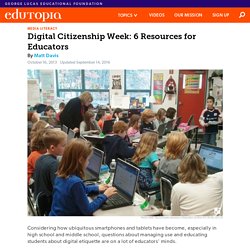
This October, Common Sense Media is sponsoring Digital Citizenship Week from October 16 to October 22. And we wanted to pull together some of the best resources to help educators talk about digital responsibility and safety online. Here, you'll find resources that cover today's digital landscape, ideas for student activities, and strategies for engaging parents. There are plenty of valuable resources for educators and parents to share, but here are six of my favorites: Digital Literacy and Citizenship Curriculum for K-12: Common Sense Media’s interactive curriculum offers something for every grade level. More Resources From Edutopia. Ten Digital Literacy Resources for Teachers. It is never too late to teach students about digital literacy.
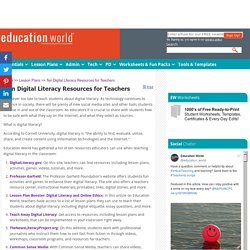
As technology continues to advance in society, there will be plenty of new social media sites and other tools students will use in and out of the classroom. As educators it is crucial to share with students how to be safe with what they say on the Internet, and what they select as sources. What is digital literacy? According to Cornell University, digital literacy is "the ability to find, evaluate, utilize, share, and create content using information technologies and the Internet. " Education World has gathered a list of ten resources educators can use when teaching digital literacy in the classroom: DigitalLiteracy.gov: On this site, teachers can find resources including lesson plans, activities, games, videos, tutorials, and more. Article by Kassondra Granata, Education World Contributor. Digital Literacy. Taking Notes By Hand May Be Better Than Digitally, Researchers Say.
Laptops are common in lecture halls worldwide.
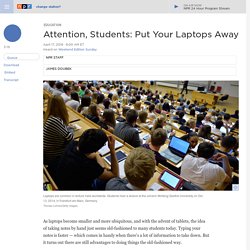
Students hear a lecture at the Johann Wolfang Goethe-University on Oct. 13, 2014, in Frankfurt am Main, Germany. Thomas Lohnes/Getty Images hide caption. Edtechmagazine. As many education tools go digital, some people have feared that libraries may go the way of the dinosaur.
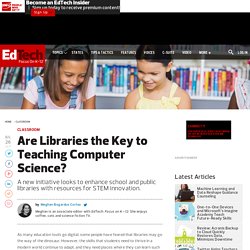
5 Digital Literacy Skills All Modern Learners Should Have [Infographic] Having good digital literacy skills just makes sense in a digital world.
![5 Digital Literacy Skills All Modern Learners Should Have [Infographic]](http://cdn.pearltrees.com/s/pic/th/literacy-learners-infographic-158506437)
The messages we create and consume, and the data we generate and absorb, require digital literacy skills to some degree. So if you’re new to them, start with checking out this infographic from Time to Know. It’s called Essential Digital Literacy Skills for the 21st Century Worker. This great graphic cites Professor Yoram Eshet, a leader in digital literacy research from the Open University of Israel. Prof. The paper goes on to describe the 5 key digital literacy skills below, taken from the article itself: Educational Technology and Mobile Learning: 9 Essential Digital Skills for 21st Century Teachers.
August 24, 2017 As we have pointed elsewhere, ' in a digitally focused world, education is getting more and more digitized pushing us, teachers and educators, to re-conceptualize what it really means to be a teacher in the 21st century.
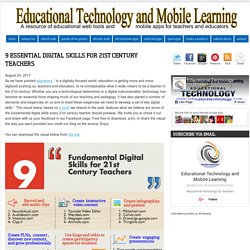
Whether you are a technological determinist or a digital instrumentalist, technology has become an essential force shaping much of our teaching and pedagogy. It has also placed a number of demands and exigencies on us and to meet these exigencies we need to develop a set of key digital skills '. The visual below, based on a chart we shared in the past, features what we believe are some of the fundamental digital skills every 21st century teacher should possess. We invite you to check it out and share with us your feedback in our Facebook page. Feel free to download, print, or share the visual the way you want provided you credit our blog as the source. You can download the visual below from this link. 63 Things Every Student Should Know In A Digital World. 63 Things Every Student Should Know In A Digital World by Terry Heick ed note: this has been updated from a previous post It could be argued—and probably argued well—that what a student fundamentally needs to know today isn’t much different than what Tom Sawyer or Joan of Arc or Alexander the Great needed to know.
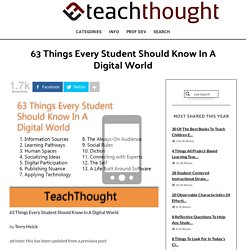
AASL Best Websites 2017- Symbaloo Gallery. The Compelled Educator: Is time spent on social media worth the investment? Sharing positive messages on social media about education is something I'm very passionate about.
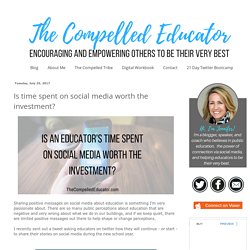
There are so many public perceptions about education that are negative and very wrong about what we do in our buildings, and if we keep quiet, there are limited positive messages out there to help shape or change perceptions. I recently sent out a tweet asking educators on twitter how they will continue - or start - to share their stories on social media during the new school year. I continue to be impressed and inspired by the educators on twitter who step onto the battlefield and fight the generally negative perception of education by sharing the awesome things that students and staff are doing across this country each year.
In addition to sharing positive messages about education and potentially diluting the number of negative messages out there, another side effect to doing this. Why Social Media Isn’t Working For Your Library. By Ben Malczewski on May 1, 2013 I’m hard-pressed to find a profession given to including the post-signature-line inspirational or motivational quotes more than librarians – well, maybe coming in a close second to teachers.
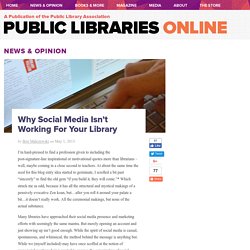
At about the same time the seed for this blog entry idea started to germinate, I scrolled a bit past “sincerely” to find the old gem “if you build it, they will come.”* Which struck me as odd, because it has all the structural and mystical makings of a pensively evocative Zen koan, but…after you roll it around your palate a bit…it doesn’t really work. Students Say They Are Not as Tech Savvy as Educators Assume. The Scientific Reason Actual Books Are So Much More Memorable Than E-Books. We all know the cycle: If you want to get clicks on the Internet, take something people love and tell them they’re doing it wrong.
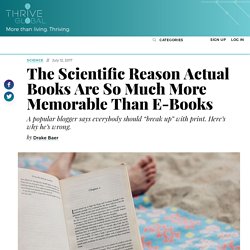
It’ll prompt reads from people worried they’re doing it wrong, shares from early adopters who agree with you, hate-reads from people who disagree, and maybe a counter-take or two from people who were so flummoxed by your argument they had to publish a reply, like this one. Such is the case with “Why you should quit reading paper books,” a perfectly titled troll from Andy Sparks, a startup cofounder and Medium blogger. "I believe everyone should quit reading print books almost entirely," he opines in the opening paragraph of the trending piece. Digital Citizenship Education in Nine Steps. Today’s students have an online playground in addition to the physical one at their schools.
But unlike school playgrounds, digital spaces are rarely monitored or supervised. As students connect, communicate, and collaborate digitally, they need to learn web literacy, source evaluation, information filtering, and self-monitoring skills. Merely teaching digital citizenship skills is not enough. Responsible online behavior needs to become part of the district or campus climate. In my school district, our journey towards cultivating a culture of digital citizenship began with a Strategic Design Plan that included seamless integration of digital citizenship “across the curriculum, so that all stakeholders collaborate in an atmosphere of respect, integrity, sharing, trust, and service,” as our plan states. 10 Ways to Search Google for Information That 96% of People Don’t Know About.
In our era of advanced technology and high-speed Internet connections, you can find information on virtually anything. In the space of just a few minutes, we can find recipes for the tastiest pie or learn all about the theory of wave-particle duality. Racist Snapchat Photo Leads To Expulsion. 8 digital skills we must teach our children. The social and economic impact of technology is widespread and accelerating.
The speed and volume of information have increased exponentially. Experts are predicting that 90% of the entire population will be connected to the internet within 10 years. With the internet of things, the digital and physical worlds will soon be merged. These changes herald exciting possibilities. But they also create uncertainty. Children are using digital technologies and media at increasingly younger ages and for longer periods of time. The digital world is a vast expanse of learning and entertainment. Moreover, there is the digital age gap. Librarian Approved: 30 Ed-Tech Apps to Inspire Creativity and Creation. Tool discovery is often a challenge for teachers interested in finding ways to use technology that will change the way they and their students work. With so much going on in the classroom, many teachers don’t have the time to test out various apps and find the perfect tool to meet their needs.
Luckily, several tech-savvy librarians have been curating the apps their colleagues find useful and sharing the all-stars with one another through personal learning communities (PLC) and edWeb webinars. Librarians in the Digital Age. In response to a controversial January 10 opinion piece in The Wall Street Journal by librarian Steve Barker, librarians around the country wrote to the paper to set the record straight about their real roles in the age of Google. ALA President Sari Feldman and President-Elect Julie Todaro also wrote in, though only a small portion of their letter appeared in the roundup of responses. (Please note that The Wall Street Journal has a paywall and requires a subscription for reading both links.) Here is the full text of Feldman and Todaro’s letter. Nothing could be further from the truth than the outdated stereotype of libraries and librarians that Steve Barker presents in his January 11 article.
Teens can't tell the difference between Google ads and search results.